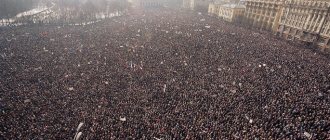Crowd psychology is a branch of psychology that studies the behavior of groups of people, identifying special mechanisms of functioning and changes in a person’s personal characteristics, as well as identifying differences between behavior inside and outside the group.
The psychology of crowd behavior was taken into a separate field, since in such a structureless society, each individual has similar emotional reactions that are manifested in other participants. It is on the basis of these mechanisms that the possibility of dissolving individuality is born, and the laws of the mass always prevail over the internal aspirations of a person (for example, intelligent people in a crowd allow themselves to behave basely, and those capable of criticism cease to adequately assess the world, etc.).
Le Bon studied the psychology of the crowd, basing his theory on the fact that the mechanism of emotional contagion (transmission of a certain type of emotions, states, thoughts) among a mass of people occurs similar to the epidemiological spread of a virus. Accordingly, the more people are involved in the interaction, the stronger the influence and the faster the spread of emotional affect. The scientist explained this effect of crowd psychology by the fact that personal responsibility is dissipated and, in a feeling of complete anonymity, people are capable of demonstrating what they would previously have corrected in their behavior.
The concept of crowd psychology implies people united not by a common goal, but only by an emotional state. This is always a lack of structure, otherwise we are talking about a team or an organized group that has a common goal and a response system in accordance with roles.
What unites a crowd is always only emotional similarity, so such clusters can appear in places of cultural interest or ideological meetings (concerts, rallies, catastrophic incidents, etc.).
Being caught up in common feelings no longer gives a person the opportunity to react differently, and the priority of the desires of the majority is genetically fixed. Because only together is it better to hunt or achieve goals, and those who went against the general mood risked remaining an outcast and dying without the support of the pack. That is why many now experience uncomfortable feelings of fear and anxiety when they express resistance to the majority - such behavior is fixed as threatening death.
Crowd types
The psychology of crowd management is based on an understanding of the different types of crowds and the leading mechanisms of influence on them. Different crowds of people may differ in the activity of the participants themselves, i.e. These are either direct active participants in the events, or the public observing what is happening. Active participants are always more involved, more easily susceptible to external influence and control, while those who just came to watch are less active and retain more individuality. A support group at a concert is always able to quickly join the fight for defending the name of a favorite than those sitting in the audience.
Depending on the activity, crowd control also changes, according to which several more types are distinguished. An absolutely uncontrollable collection of people arises spontaneously; it has neither a goal, nor a leader, nor organizational mechanisms. In terms of the power of destructive consequences, this is the most terrible type of crowd, since there are no mechanisms of influence.
An uncontrollable spontaneous crowd occurs in public places (stadiums and subways, areas of natural disasters or mass celebrations). These people have different goals, ending up together only by chance. People who obey specific commands of one leader belong to the led crowd, where one person or a small group is able to regulate the emotions of a large crowd of people, adjust their motivation and lead them in the right direction.
An even more manageable crowd is an organized one, which has not only a clear leader capable of changing its mood and direction, but also common goals and pre-agreed meeting places and the duration of planned actions. This is a well-organized movement, characterized by maximum efficiency in its actions and achieving any goals thanks to a clear internal structure and common interests.
In terms of emotional content, the crowd differs and changes in the same way as the emotional and mood sphere of the individual. This could be an aggressive group of people rebelling against an unsatisfactory order, or it could be a crowd of people paralyzed by fear or panic as a result of disasters that have occurred.
Euphoric gatherings of people occur at concerts or peaceful rallies, where the main driving forces are emotions of pleasure and joy. Often euphoria comes into contact with expression, where the main thing is the unhindered and vivid expression of feelings. An expressive crowd unites people into a group based on a common attitude towards someone's event, while a conventional crowd unites on the basis of a common cognitive interest.
Another point of difference between the types of crowd is its homogeneity. A heterogeneous crowd is most often born where meetings take place spontaneously, and it is usually anonymous - there no one knows anyone and all personalities are erased into one. Where people gather intentionally, most often the meeting is personalized, the personalities, names, regalia, or at least the larger community represented by the participants are known. Options if gatherings united by interests or ideas imply greater homogeneity. There is also an artificial division of people into classes and sects, ages and income levels - all this came from the scientific world and is presented by the crowd only by prior agreement on a meeting or joint action (church service, rally, celebration, etc.).
Feature #4
The crowd has no voice! What does it mean? The management system in the world is built on choice. Choosing what or who? The election process itself supposedly represents the casting of votes for a worthy candidate from the people. Where? Deputies, senators, presidents - in general, anywhere, but not to support the interests of the people. Why?
Because the system itself is designed in such a way that the management structure is based on irresponsibility, but with a beautiful justification. What does it mean? An ordinary individual believes that when electing a president, deputy or mayor, the latter will fulfill his promises. How many of these chosen ones fulfilled their promises? Maybe 1 out of 100, and then the system will eat him up and force him to leave his post. You don’t need to go far to Yakutia for an example.
Who is guilty? An individual who, by casting his vote, loses his status as a person or an actor in a political theater built into a complex system of duping individuals? Not a single individual has the question: “Maybe it’s not about the chosen one, but about the system?”; “Maybe it’s enough to support the imposed system and eat all the information crap they feed you?” “All of you who go out into the streets to rally, do you really think that by removing Putin you will change the system?” - if 10% of the population thinks so, then we’re not done yet!
What do the numbers and facts say?
And if you look the facts in the eye, then in Irkutsk many people took to the streets, let me exaggerate the number, but according to the video, no more than 7-8 thousand. And about 700 thousand live in Irkutsk. Let’s remove babies and old people, and in the end we have only 3-4% who succumbed to Navalny’s manipulation. Not so much, which is good news!
Unfortunately, an individual is not able to adequately assess the situation in which he finds himself! And this position is always a sacrifice when casting your vote! If you cast your vote, be kind enough to take responsibility for it! Because NOT knowing the laws does NOT exempt you from responsibility!
Each such person who casts a vote automatically ceases to bear responsibility for himself, his children, his grandchildren, thereby violating the foundations of the Laws of the Universe!
The basis is to create a favorable environment for the life of your children for 3 or more generations to come! Do any people think about this when they go to cast their vote for Zhirinovsky, Putin or Navalny, turning into an incapacitated individual?
I am 100% sure that everything written will reach only 1-2% of individuals who will begin the process of rethinking. However, not everything is so bad and not everything is lost. Let me be wrong, and over the next 6-12 months 10% will realize the situation. Then victory will be for the people. After all, if only 10% of the entire population of the Earth changes, cardinal processes of change will begin throughout society.
Psychological properties of the crowd
The psychology of the mass of the crowd is built mostly on unconscious processes that arise as a result of the excitation of certain brain centers under the influence of changes in important value categories. Large-scale riots begin when for many people the opportunity to earn money was affected, an organization for the reconstruction of something appears after the destruction of important monuments or buildings - society has always united in order to jointly cope with what one person cannot overcome.
Communication in the crowd, through which preparatory influence is exercised, has a special property. No one succumbs to the external influence of those who do not convey ideas close to him or follow the opposite opinion.
To enter into another person’s picture of the world, either consciously or accidentally, completely different communication mechanisms are used than direct conversation, which is typical for dialogue. Mass communications play an important role, covering a large audience - newspapers, the Internet, television and other media. These are officially recognized channels of interaction between large masses of people; unofficial ones include gossip and rumors, as well as any sources where the subjective opinion of a person plays a big role, and not the actual event. The main property of the crowd is that information and opinion enter the consciousness, similar to a vinaigrette - there are rumors, and the latest news and theories of feature films.
The crowd is unconscious, and the people in it act at the level of basic instincts. Here impulsiveness plays a big role, being caught up in emotions, instead of a reasonable analysis of the situation, and the one who, being in the crowd, tries to criticize what is happening, to include a rational approach, will either leave the general structure or be trampled by it.
The herd instinct, which serves to ensure that the entire species survives, is key - it is necessary in extreme situations of war, famine, defense, but is also included for other general purposes. Due to instinctive behavior, the variability of a person’s reactions is narrowed, and he saves time on everything, acting more intuitively. The actions of the crowd can only be restrained or redirected by a team, and the authority of the leader must be absolute.
Being in a large group, a person thinks mainly in images, his imagination works stronger than when alone or in dialogue. There are no moments of reflection or criticism; images imposed from the outside are perceived as real, while they are categorically simple. The larger the crowd, the more simple theses and images are understandable; analysis of complex or graded concepts is simply not available. The main thing in such images is always not truth and objectivity, but desirability, as a result, those who want delicious apricots will follow the one who says that they are ten meters away, without thinking about the discrepancy between the climate and what they themselves see at this distance only emptiness.
The crowd is categorical and conservative, there are no doubts about the truth, there is no patience and tolerance for other points of view, but there is persistence and forceful pressure. New alternative ideas can only be accepted if they are charismatically expressed by the former leader, but in other cases the majority will strive to preserve the old social order, as a symbol of security. Hence the increased suggestibility of the crowd, since people in it do not distinguish between half-tones - they either accept the idea completely (which means additional necessary points can be included there) or categorically reject it.
Feature #5
The basis of the crowd is incompetent individuals. And the basis of a united group of people is a person who knows his past, understands where he is in the present and has a plan for solving problems for the future . Groups of people united by the same symbols, similar goals and objectives, and having similar action plans are called the PEOPLE.
All those who go to rallies and protests, do you really consider yourself the people? Then present to everyone else a step-by-step action plan that will help you, other people, your children get out of all this crap, with the help of rallies?
If someone wants to respond in a comment like: “First we’ll remove Putin, and then we’ll decide everything!” - then it’s better not to comment at all. Statements like these define you as an individual! And I’m not interested in knowing what an individual is thinking about. Therefore, such comments will not even be published!
Stages of crowd formation
The emergence of even a random and inhomogeneous crowd never occurs without social conditioning and occurs in stages. Each mass of people has a core that holds them all together - these can be specially appointed or informal leaders, emotionally significant people or those who best navigate the situation. The initial core may arise from logical motives, so in accidents people come together to provide help, while there are victims and those who have medical skills or can help organize movement to the hospital. Then to these people are added those who are caring, capable of participating, or seeking protection. It is from the moment other individuals join that the crowd begins to enter into a circular movement.
When the crowd begins to swirl, a stage of increasing emotions, increasing affect occurs, and the surrounding society begins to divide into polar clans. In this process, there are always people whose opinions enter the psyche of others without any criticism, as a result of which the tendency to commit uncontrollable, spontaneous, dangerous actions increases significantly. Here there is a disappearance of personal responsibility, the dissolution of one’s personality and the acquisition of anonymity.
After a large community has been formed with cohesive interests, a new common object of unity is formed based on the different opinions expressed. If at first it was a natural disaster, then a joint discussion may give rise to a search for or blame on specific people or structures for what happened. Attention shifts, but a completely new and absolutely common goal appears, born from the minds of the participants in the process of interaction. At this stage, people are as united as possible and then the need for a new core formation arises.
Activists, leaders, instigators or provocateurs appear to lead the crowd. Being in it, they can shift emotional accents, through which they can guide people’s actions. It is not necessary to understand how to lead a society and strive for reformation into something good. These could be immature individuals with borderline disorder, psychopaths and manipulators, children and extremists - the main thing is to be able to emotionally shake up the crowd, the goal in this context is secondary.
Feature #3
The crowd is always blind and never sees where it is being led! A conscious group clearly understands the goals, sees solutions and acts according to the overall plan.
Do you know why people are now losing the fight against the power system? There are very few people, and those who take to the streets are not people, but only a crowd. It makes me very sad to write this, but it’s true! And everyone needs to consciously accept this position. Have you heard the following saying: “If you want to change the world, start with yourself”! How long until the crowd realizes their ignorance?











